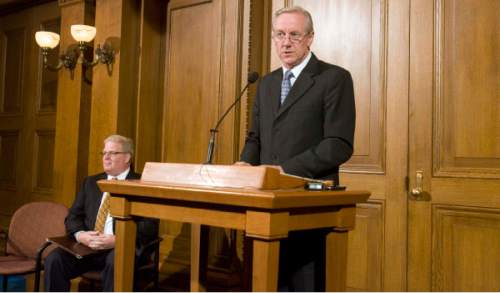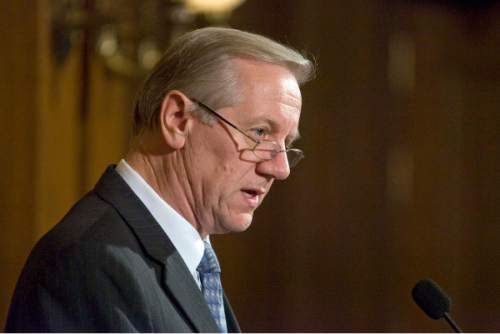This is an archived article that was published on sltrib.com in 2015, and information in the article may be outdated. It is provided only for personal research purposes and may not be reprinted.
Every word the LDS Church's Public Affairs Department issues on behalf of the Utah-based faith has been vetted and approved by higher Mormon authorities, the church's top spokesman said Friday.
The department does not go "rogue," managing director Michael R. Otterson reaffirmed in a speech, "On the Record," at the two-day FairMormon Conference in Provo. "News flash — we don't freelance."
Otterson was responding to critics who, he said, may not like church statements on the Boy Scouts or immigration reform, for example, and would prefer to believe those messages come from PR staffers, not from their ecclesiastical leaders.
His department answers to a Church of Jesus Christ of Latter-day Saints' committee, made up of two apostles, a senior member of the Seventy, the presiding bishop, the church's legal counsel and a female officer. An additional Seventy serves as executive director of the department, who works closely with Otterson. The committee meets weekly, but various members might talk with him daily, even hourly.
"The Public Affairs Department does not have its own agenda, independent from the Brethren [LDS general authorities]," Otterson said. "We frequently suggest a response to a breaking issue, but the Brethren are not shy in editing or rejecting those statements or writing their own versions. ... Our task is to find language that most accurately reflects what's in the Brethren's minds."
In his 45-minute speech, the British-born spokesman dealt briefly with an array of topics, both personal and professional.
Otterson said:
• He was converted to Mormonism at age 19 in Liverpool, England — and, no, he never met the Beatles — where he read plenty of books about his new faith, most of which were written by anti-Mormons.
• His LDS "patriarchal blessing" said he would have opportunities to "defend" the faith.
• He was married and working as a business editor of the Liverpool Daily Post in 1974, when he was tapped to help the church with its public relations. Thus began a 40-year sojourn in that arena, 24 of which have been at LDS headquarters.
• He views "habitual criticism of the Brethren as one of the pernicious of pastimes."
• Several top Mormon leaders gave up lucrative, successful careers to become apostles. "Their stipend and [living ]allowances may literally be less than a tithe [tenth] of what they previously earned."
• Some past language the LDS Church used to describe homosexual behavior was "intemperate, even harsh." Today, there has been a "more careful and considerate choice of language as the church has engaged with the pro-gay-rights movement. ... Our language has changed in order to speak to an evolving audience even as our standards of chastity have remained constant. ... A strident voice from the church is going to do nothing to change behavior."
• Can a member be a Democrat and a good Mormon? That question makes him smile, thinking of "faithful members of the church who belong to their national communist parties."
• LDS general authorities do not "direct the outcome of disciplinary councils [in which members can be excommunicated]. ... A stake president [regional leader] may confer with Area Seventies up their priesthood line for counsel about the process but not about decision and outcomes."
• There is "momentum inside the church organization" on women's issues and to address inequities. Six women were present at a meeting of the Priesthood Executive Committee. The "Brethren try to embrace women's voices." To that end, the Public Affairs Department created a "women's outreach group" with about eight "highly professional, faithful, seasoned women."
• No "factions" exist among the Quorum of the Twelve Apostles. There is no Boyd K. Packer camp or Dallin H. Oaks group.
"I have seen the diversity of opinion aired [among them] and thoroughly talked through," Otterson concluded, "unless they are united, however, an issue doesn't go forth."
Peggy Fletcher Stack





